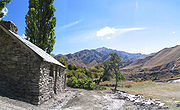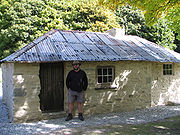
Macetown
Encyclopedia

Otago
Otago is a region of New Zealand in the south of the South Island. The region covers an area of approximately making it the country's second largest region. The population of Otago is...
region of the South Island
South Island
The South Island is the larger of the two major islands of New Zealand, the other being the more populous North Island. It is bordered to the north by Cook Strait, to the west by the Tasman Sea, to the south and east by the Pacific Ocean...
of New Zealand
New Zealand
New Zealand is an island country in the south-western Pacific Ocean comprising two main landmasses and numerous smaller islands. The country is situated some east of Australia across the Tasman Sea, and roughly south of the Pacific island nations of New Caledonia, Fiji, and Tonga...
.
In 1862 the sailor, William Fox discovered gold in the Arrow River. By the end of that year over 1,500 miners were camped along the river and a small canvas town had grown up at the junction of 12 Mile Creek and the Arrow River. Amongst those that flocked to the area were three brothers: John, Charles and Harry Mace after whom the town came to be known. In 1863 the population was around 300. At its height the town boasted a school, a church and two hotels.
By 1865 most of the alluvial gold had been extracted and many miners left for the gold fields of the West Coast. Quartz mining attracted more people in the 1870's and the population climbed to a peak of 206 in 1896.
By the start of the 20th Century, the town was in decline and has long since been deserted. Little remains of the original buildings but the old schoolmasters house and the bakehouse have been faithfully restored by the Department of Conservation
New Zealand Department of Conservation
The Department of Conservation , commonly known by its acronym, "DOC", is the state sector organisation which deals with the conservation of New Zealand’s natural and historic heritage...
.

Arrowtown
Arrowtown is a historic gold mining town in the Otago region of the South Island of New Zealand. Arrowtown is located on the banks of the Arrow River approximately 5 km from State Highway 6...
car park.
Residents
William Tily Smith ran a store in Macetown for over 50 years. He also did the twice weekly mail run to Arrowtown and built the bakehouse.Oliver Palmer was a member of a the 'Twelve Apostles', a group of miners who spent all their money on gambling and alcohol. They would gather at the Montezuma Hut and referred to each other by a variety of lofty titles such as 'The King', 'The Doctor' or 'The Saint'.
Many Macetown residents migrated to Arrowtown in the early 1900's to work in Queenstown. These included the Anderson family who ran the hotel and the Tallentire family. The youngest son, Thomas Tallentire, later became the editor of the Queenstown Daily Mail in the early 1930's.
William Jenkins frequently rode wildy through the streets of Macetown. By 1921 he was the only remaining resident and promptly declared himself Mayor. His mother had run the Alpine Hotel.

